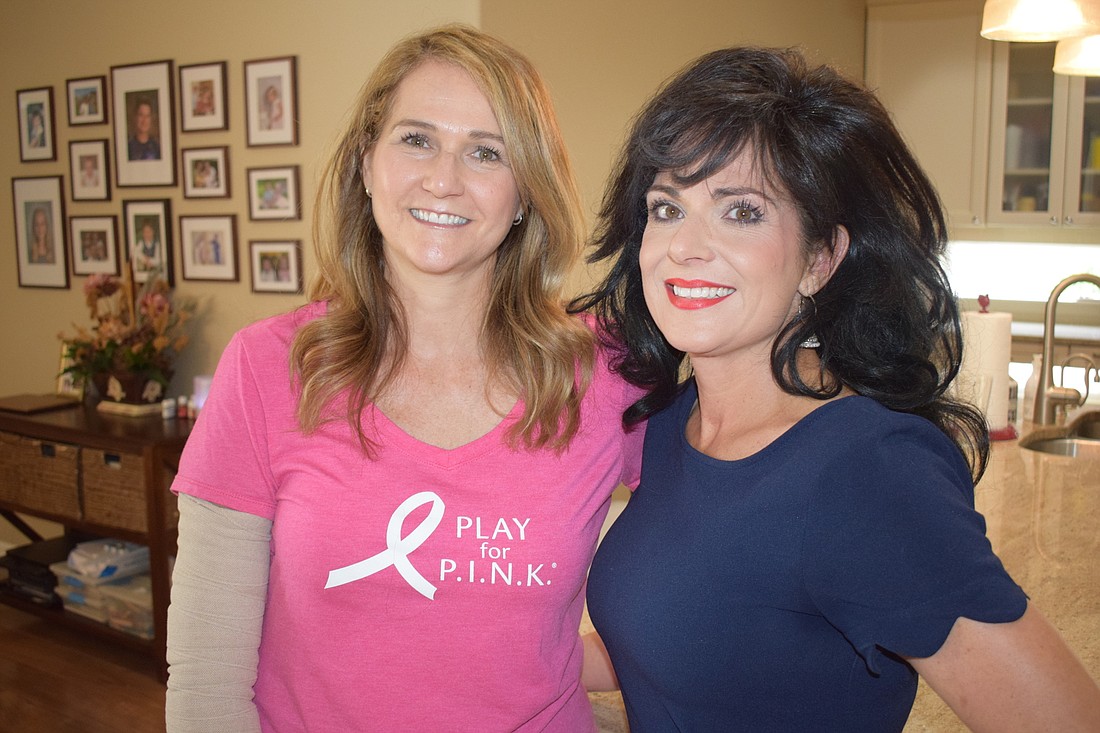- March 13, 2025
-
-
Loading

Loading

Breast cancer seems like such an overwhelming battle that affects so many, you might wonder whether a benefit golf tournament and comedy show can make a difference.
Sitting next to Julie Veith and her friend, JoAnne Hampton, Oct. 7 at Veith's Greenfield Plantation home, the answer was delivered in living color.
Sarasota's Hampton was diagnosed with breast cancer in 2003 at the age of 33. She was living on Long Island in New York at the time.
Veith was diagnosed with breast cancer in 2014.
The two were sharing stories about what was available to them when they were diagnosed.
"It is absolutely, completely different now," Hampton said. "When I was diagnosed, there were no pink ribbons or golf tournaments. To see the support they get now is moving."
Hampton said she felt "people didn't know anyone with breast cancer" because it wasn't talked about as openly as it is today. She said nobody felt like they knew what to say to someone with breast cancer (she now has a Facebook site, Women's Wellness with JoAnne, where women can discuss breast cancer openly). She was fighting a lonely battle and it wasn't like anyone was bringing food to the house in support.
Veith, meanwhile, had a line of fellow church-goers and neighbors at her door when she was diagnosed.
"Now you have a food chain," Hampton said.
Much of that has to do with awareness, which might be the greatest impact a legion of benefit tournaments has had. In 2018, Julie and Bryan Veith started the Play for Pink Golf Tournament, which makes its second run Oct. 25 at Heritage Harbour Golf & Eatery. Along with the golf tournament is the Play for Pink Dinner and Comedy Show on Oct. 23, at the same venue.
Besides awareness, all the benefit tournaments and other events combined have fueled research into breast cancer and its treatment. Hampton, who is 49 and has had 10 surgeries related to her breast cancer, said the technology wasn't advanced when she was diagnosed in terms of treatment or reconstruction. She said a very small pool of doctors were available and that limited her options. Now she said, "So many doctors are doing this."
As a result of breast cancer treatments and removing lymph nodes, both women suffer from lymphedema ... Veith in her right arm and Hampton in both her arms. Lymphedema occurs when damaged or removed lymph nodes are unable to drain lymph fluid which comes to fight infections or injuries. When the fluid doesn't drain, the affected part swells.
To combat the swelling, both women wear compression sleeves and gloves. On Hampton's visit, she and Veith spent time joking about what a pain it is to wear the sleeves and gloves.
"It's hot, it's yucky, it's smelly," Hampton said. And then she laughed.
The two women have been through a lot, and it's not always easy to laugh.
Veith's lymphedema has caused her considerable pain and suffering after her breast cancer treatments were finished. She worries that people will believe the war against breast cancer has been won because the fatality rate, percentage-wise, from breast cancer has dropped.
"It's important for people to know that no, we haven't won the battle with breast cancer," said Veith, who is 47. "A lot of people see it as an old lady's disease. It's not."
Although many "survivors" have been cleared of the breast cancer, they are dealing with many other issues caused by the disease and its treatment. The toll is both physical and mental.
"The swelling for me started in 2015 after I had lymph nodes removed," she said. "I got it very much under control, but then it came back. The swelling is not pretty. You don't want to walk around with one arm twice the size of the other. My arm is heavy, painful, weak."
An occupational therapist, Veith has had to cut back on her work hours. If she injures her arm, the lymphedema can cause major problems such as skin infections. She can't lift anything over 20 pounds, so if she is working with an adult patient and the patient's knees buckle, she is hard-pressed to hold them up.
It's not just work, either. Veith used to ski and those days are gone. Even one of her favorite hobbies, gardening, can lead to trouble if she gets a thorn.
Besides everything else, she doesn't go out at times.
"You feel ugly," she said. "It does hold me back. I'm constantly trying to hide it."
Last November, the lymphedema led to cellulitis and Veith knew the disease was progressing. She went to the breastcancer.org site and tried a forum, asking women if they had found any solutions to her problem. Eventually, she learned about Dr. Wei Chen of the University of Iowa Hospitals and Clinics. He specializes in lymph vessel transfers.
On Aug. 13 in Iowa, she had a "flap surgery" where lymph vessels were transferred from her groin area to her right forearm. She immediately found her arm to be much smaller and the area around her forearm and elbow felt softer with the fluid moving better. On Nov. 18 she returns to Iowa to discover whether the new lymph vessels are doing their job to move fluids.
She wants to be positive, but she doesn't want her expectations to be so high she is disappointed.
"The majority see improvement more than they see a cure," she said. "At least I want to slow the progression of the disease."
Both women are hoping people support the golf tournament and the comedy show. They say so much work has yet to be done.
Hampton said, "Every woman who has had breast cancer, when they get a headache, a cramp, the first thing they worry about, 'Is it cancer?' "Is it back?'"